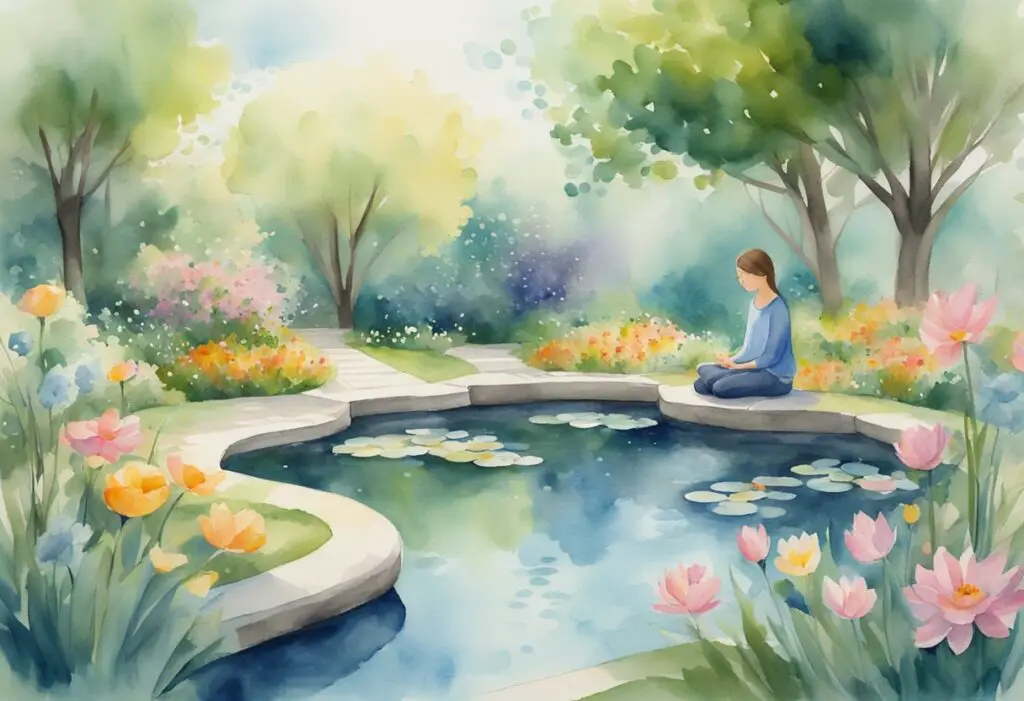Gratitude is often touted as a key ingredient for happiness—a wholesome aspect of life that yields a multitude of benefits.
Embracing gratitude as a spiritual practice is not just about saying “thank you” or acknowledging the good in life on a surface level. It’s about cultivating an attitude that permeates your thoughts and actions, influencing your approach to life’s challenges and your interactions with others. This deeper appreciation can pave the way for a more fulfilling and meaningful existence.

When you incorporate gratitude into your spiritual routine, you set the stage for a transformative experience. It’s not merely about listing the things you’re grateful for; it’s about feeling a profound sense of thankfulness that connects you to something greater than yourself. As you begin to notice and appreciate the simple pleasures, the beauty in nature, the kindness of strangers, or the love of friends and family, you start to experience life through a lens of abundance rather than scarcity.
This shift in perspective can have a profound impact on your well-being. Studies suggest that individuals who practice gratitude report feeling more alive, sleep better, express more compassion and kindness, and even have stronger immune systems. By making gratitude a cornerstone of your spiritual practice, you open yourself up to a world where every moment is an opportunity for growth, connection, and joy. Engaging with gratitude in this way becomes a journey, one that can lead you to a richer, more vibrant life.
Understanding Gratitude
In exploring gratitude, you will discover its deep-seated role in enhancing your spiritual and emotional well-being.
The Concept of Gratitude
Gratitude is recognizing and appreciating the positive aspects of life. It’s about acknowledging the good in experiences, people, and the world around you. By fostering an attitude of gratitude, you’re able to shift your focus from what’s lacking to the abundance that’s already present.
- Elements of Gratitude:
- Acknowledgment: Noticing the goodness in life.
- Appreciation: Feeling thankful for the goodness received.
- Expression: Conveying thanks through words or actions.
Historical Perspectives
Throughout history, gratitude has been a cornerstone in many spiritual and philosophical traditions. Ancient texts and teachings often emphasize the virtue of thankfulness as a moral obligation and a pathway to a fulfilling life.
-

Celestial Soul Eco-Friendly Tote Bag
$18.50 Select options This product has multiple variants. The options may be chosen on the product page -

Celestial Soul Women’s T-Shirt
$20.00 – $21.50 Select options This product has multiple variants. The options may be chosen on the product page
- Examples in history:
- Ancient philosophers, such as Cicero, called it the “mother of all virtues.”
- Religious texts across multiple faiths highlight gratitude as fundamental to spiritual practice.
The Spiritual Dimensions of Gratitude

Gratitude enriches your spiritual life by connecting you with a sense of the sacred and the profound appreciation for life. Let’s look at how gratitude weaves into various spiritual traditions and intersects with the practice of mindfulness.
Gratitude in Various Spiritual Traditions
- Buddhism: You’ll find gratitude is essential in Buddhism, which teaches the importance of thankfulness as a way to decrease desire and foster contentment.
- Christianity: In Christianity, gratitude is a heartfelt response, reflected in prayers and an acknowledgment of the blessings from God.
- Hinduism: Gratitude in Hinduism is often expressed through daily rituals and the idea of karma, encouraging positive actions for a harmonious life.
- Islam: The practice of shukr in Islam is the expression of gratitude toward Allah, seen as a fundamental aspect of faith and well-being.
- Judaism: Jewish tradition emphasizes gratitude as a daily practice, with specific prayers to give thanks for the myriad aspects of life.
Gratitude and Mindfulness
Mindfulness, a practice where attention is paid to the present moment without judgment, pairs seamlessly with gratitude.
- Practice: Incorporate gratitude in mindfulness by acknowledging the positive aspects of the present.
- Benefits: This combination can lead to a deeper appreciation for the ‘now’, reducing stress and fostering a sense of peace.
By focusing on the good in your current experiences, you cultivate a mindful gratitude that can transform your spiritual well-being.
Practical Approaches
Incorporating intentional actions into your daily life can significantly enhance your sense of gratitude. Here are straightforward methods to nurture appreciation each day.
Daily Gratitude Practices
-
Set a Gratitude Reminder: Choose a regular time each day to pause and think of three things you’re thankful for. It could be during your morning routine, on your break, or before you go to sleep.
-
Mindful Moments: Take brief moments to be present and savor your experiences. Whether you’re enjoying a meal or walking in nature, focus on the positive sensations and feelings.
-
Express Thanks: Make it a point to verbally express gratitude to people around you when they do something kind. This not only increases your gratitude but also strengthens your relationships.
Gratitude Journaling
-
Consistency is Key: Strive to write in your journal daily. Even on challenging days, jot down at least one thing you’re grateful for to maintain a positive habit.
-
Specificity Helps: Be as detailed as possible. Instead of writing “I’m thankful for my friends,” specify what about your friends you appreciate, such as “I’m thankful for my friend’s supportive words today.”
-
Reflect Weekly: At the end of each week, review what you’ve written. This reflection can provide insight into the abundance of positivity in your life and promote a deeper sense of gratitude.
Benefits of Gratitude

Practicing gratitude can significantly enhance your life by improving your emotional state and strengthening your social connections.
Emotional Well-Being
- Reduces Negative Emotions: By focusing on what you’re thankful for, you reduce feelings of envy and resentment, while increasing happiness.
- Resilience: Gratitude builds emotional strength, helping you recover from stressful events and challenges more quickly.
Social Benefits
- Improved Relationships: When you express gratitude towards others, it fosters positive connections and can help in forming and maintaining strong relationships.
- Higher Esteem for Others: Emphasizing thankfulness often leads to appreciating others’ contributions, which can boost communal harmony and reduce social comparisons.
Challenges and Misconceptions

Incorporating gratitude into your spiritual practice is not always straightforward. Understanding common hurdles and clarifying misconceptions can greatly enhance your journey.
Common Obstacles
- Busy Lifestyle: Your hectic schedule might make it seem difficult to find moments for gratitude. It’s important to identify small opportunities throughout your day, like during your morning routine or in between tasks, to reflect on what you appreciate.
- Emotional Challenges: Sometimes, when facing personal adversity, finding reasons to be grateful can feel insincere or forced. Remember, gratitude is not about ignoring hardships but about recognizing the good that coexists with the challenges.
Dispelling Myths
- Gratitude Is Always Joyful: It’s a common belief that gratitude should evoke feelings of happiness. However, gratitude is also about acknowledging growth and learning from all experiences, not just the joyful ones.
- Gratitude Means Constant Positivity: You might think you need to be positive all the time to practice gratitude effectively. In reality, gratitude is about balance and recognizing value in a wide array of experiences, not about suppressing negative emotions.

